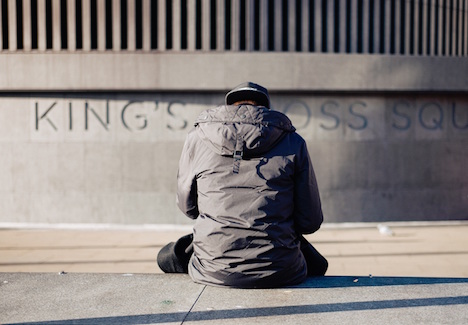Charles is caught in a self-destructive cycle that causes him much pain and immobilization. It is a cycle that many people are stuck in.
The negative cycle starts with some form of self-judgment:
“I’m a failure. I will never really amount to anything.”
“I’ve made so many mistakes that I will never be able to get my life back on track.”
“I’ve blown it again – I will never be able to stop drinking.”
Self-judgment is the opposite of loving yourself. It is the opposite of being a kind and trustworthy loving adult with yourself. Self-judgment is a form of control: the wounded self hopes that by judging yourself you can get yourself to change and do things “right.”
But the real result of self-judgment is pain. Your inner child is in pain from being emotionally beat-up by judging yourself.
For Charles, as for many other people, this pain from a lack of loving yourself leads to acting out with addictive behavior – overeating, drinking too much and smoking. Charles uses these addictions to numb out the pain from his self-abusive thoughts. Then, when he wakes up the next day feeling hung over, having gained another pound, he beats himself up again:
“I’m such a jerk. I have no self-discipline. I had resolved to stop drinking and I really blew it. I’m just a useless blob. No wonder my wife divorced me. I shouldn’t even be on the planet.” Charles continues to cause the very pain that leads to the addictive behavior, continuing the self-destructive cycle: self-judgment –> pain –> addictive behavior –> self-judgment –> pain –> addictive behavior, etc.
This cycle will not change until the behavior that triggers it – self-judgment – changes. Yet Charles is deeply addicted to the self-judgment as well. We all tend to get addicted to whatever gives us a sense of control over our feelings, our actions and the outcome of things. Charles believes that judging himself – rather than loving himself – will ultimately give him the control he wants. Yet the real result is powerlessness and despair.
How can Charles change this? In order to shift this cycle, Charles needs to change his intent. He needs to shift his focus from controlling to kindness toward himself. He needs to become a trustworthy loving adult with himself – an adult who is reliably kind to himself. He needs to accept, with deep compassion, his judgmental, addictive, wounded self. Instead of judging himself for judging himself and for his eating, drinking and smoking, Charles needs to get himself off the hook. He needs to learn to love himself
He needs to recognize that the part of him who judges, drinks too much, eats too much, and smokes is a scared, hurt, wounded child or adolescent who learned early how to avoid pain. The original pain came from his judgmental and abusive father, but now the pain is coming from treating himself just as his father treated him. As long as his wounded self is in charge, Charles will continue this painful cycle.
When Charles moves into acceptance of his wounded self, he will start to treat himself in the way he always wished his father would treat him. His wounded self is starving for kindness, compassion and understanding.
In a session with Charles, I advised him to focus on loving himself by focusing on kindness toward his wounded self. Most of us know what kindness looks like. We know how to be kind to others when we want to be. Charles had spent much of his life being kind to others and trying to get others to be kind to him, rather than focusing on being kind to himself.
No matter how kind others are to Charles, if he is beating himself up with his self-judgments, he will continue to be in pain and act out addictively to avoid the pain. All the kindness in the world from others cannot ameliorate the pain that Charles causes from his own self-judgments – his own lack of self-love.
Loving yourself by being kind toward yourself is a moment-by-moment choice. Anytime you feel anything other than inner peace and fullness, it is because you are not thinking and behaving in ways that are kind and caring to yourself.
You might be surprised at how rapidly addictions can heal when you learn to love yourself.
Join Dr. Margaret Paul for her 30-Day at-home Course: “Love Yourself: An Inner Bonding Experience to Heal Anxiety, Depression, Shame, Addictions and Relationships.”
Join IBVillage to connect with others and receive compassionate help and support for learning to love yourself.
Photo by Clem Onojeghuo



 Listen to Dr. Margaret Paul's interview with
Listen to Dr. Margaret Paul's interview with 

